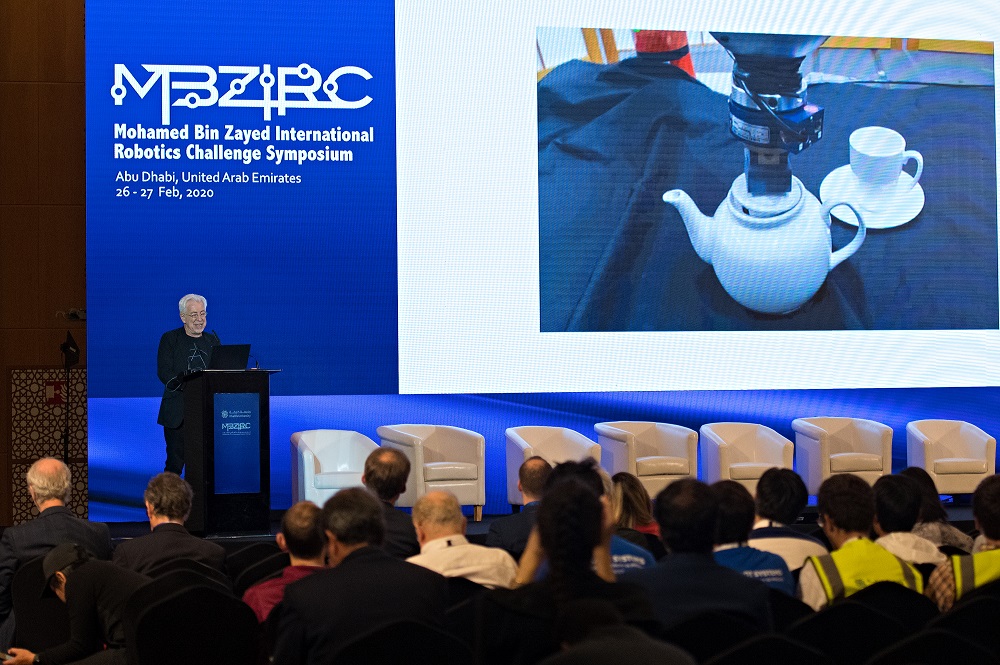
MBZIRC 2020 Reiterates Relevance to Future Smart City Solutions in ‘Security and Defence’, ‘Construction and Infrastructure’, and ‘Fire-Fighting and Emergency Response’
The Mohamed Bin Zayed International Robotics Challenge (MBZIRC) 2020, the second edition of the prestigious biennial international competition, drew to a successful conclusion in Abu Dhabi, reiterating its relevance to future smart city solutions including security and defense, construction and infrastructure, as well as fire-fighting and emergency response.
The three-day Challenge witnessed the participation of 32 teams from 17 countries, selected out of 134 teams that had originally applied to compete, while gathering a large assembly of more than 400 robotics and artificial intelligence experts at the Abu Dhabi National Exhibition Center (ADNEC) from 23-25 February. MBZIRC 2020 was supported by Tawazun Economic Council, and Abu Dhabi Police, while EDGE was the advanced technology partner.
The Challenge was immediately followed by the first-ever two-day MBZIRC Symposium, offering the teams an opportunity to learn about each other’s UAVs and UGVs, and showcase the projects directly to industry representatives, in order to further increase interest and raise awareness, while facilitating opportunities for research collaborations.
Dr Arif Sultan Al Hammadi, Steering Committee General Co-Chair for MBZIRC 2020, said: “The intensely exciting MBZIRC 2020 and its successful conclusion, comprehensively illustrated the pivotal role of Khalifa University in furthering innovation in robotics and artificial intelligence. The competition adequately highlighted the role of UAVs and UGVs in a smart city’s vital areas such as security, infrastructure and emergency.”
Dr Al Hammadi added: “We thank the UAE leadership for their consistent support to Khalifa University and all our research and academic-related endeavors, encouraging the university to widen the industry-academia-government collaborations to drive innovation in science, technology and engineering fields. We thank the sponsors, panel of judges and everyone who contributed to the success of the second edition, as we look forward to the next edition of MBZIRC.”
Shahab Issa Abushahab, Chief Strategy Officer, Tawazun Economic Council, said: “We are proud of the notable results of the second edition of MBZIRC, and extend our appreciation to all stakeholders for making the challenge a home for cutting-edge technology and innovation. Our support for MBZIRC 2020 is aligned with Tawazun’s mandate to support technology and innovation and create opportunities for the young generation to contribute towards building a diversified economy in the UAE, driven by innovation and creativity. At Tawazun, we continually invest in the creative ideas of our people and promote a strong culture of innovation to achieve a competitive position for our country in advanced high-tech industries.”
There were four iconic challenges – Challenge 1, Challenge 2, Challenge 3 and the triathlon Grand Challenge – to test advanced embodied AI technical skills. The Czech Technical University-University of Pennsylvania-NYU team, the Grand Challenge winner, demonstrated exemplary skills in safety, construction automation and fire-fighting.
Each of the winners in the Challenge categories had individually displayed their drones’ performance, stamping their authority in integrating machine learning algorithms. Challenge 1 tested the UAVs and UGVs in autonomously tracking, capturing and neutralizing intruder drones, while Challenge 2 was a test of skills in construction automation and robot-based 3D printing of large structures. Challenge 3 assessed how a team of UAVs and a UGV collaborate to autonomously extinguish a series of simulated fires in an urban high-rise building.
Keeping in line with the UAE leadership’s objective towards capacity building, the young Emirati team Al Nokhba, performed strongly in the MBZIRC 2020 categories, emerging among some of the most prestigious universities and research centers worldwide.
The criteria the judges looked for in each team’s performance included robust perception and tracking of dynamic objects in 3D, sensing and avoiding obstacles, GPS-denied navigation in indoor-outdoor environments, physical interactions, complex mobile manipulations, and air-to-surface collaboration.
The MBZIRC 2020 was officiated by an elite panel of judges that included globally-renowned scholars and eminent researchers in robotics and artificial intelligence from some of the top universities and research labs in the world. The international judges were supported by over 10 judges from among Khalifa University faculty, as well as arena managers and scorers.
Clarence Michael
News Writer
27 February 2020